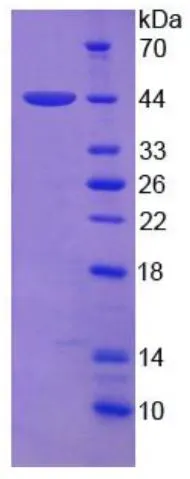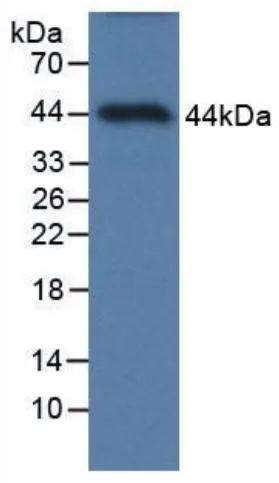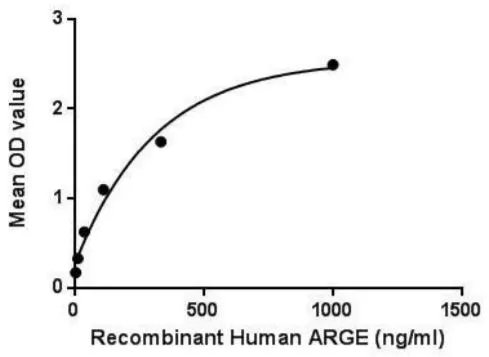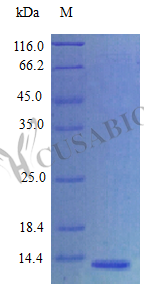
SDS-PAGE analysis of GTX00421-pro Human Amphiregulin protein.
Human Amphiregulin protein, His and GST tag
GTX00421-PRO
ApplicationsFunctional Assay
Product group Proteins / Signaling Molecules
Protein IDP15514
Overview
- SupplierGeneTex
- Product NameHuman Amphiregulin protein, His and GST tag
- Delivery Days Customer9
- Application Supplier NoteAmphiregulin, also known as AREG, is an autocrine growth factor as well as a mitogen for astrocytes, Schwann cells, fibroblasts. It is related to epidermal growth factor (EGF) and transforming growth factor alpha (TGF-alpha). This protein interacts with the Epidermal growth factor receptor (EGFR) to promote the growth of normal epithelial cells. Besides, Epidermal Growth Factor Receptor (EGFR) has been identified as an interactor of ARGE, thus a binding ELISA assay was conducted to detect the interaction of recombinant human ARGE and recombinant human EGFR. Briefly, ARGE were diluted serially in PBS, with 0.01% BSA (pH 7.4). Duplicate samples of 100 microl were then transferred to EGFR-coated microtiter wells and incubated for 2h at 37C. Wells were washed with PBST and incubated for 1h with anti-ARGE pAb, then aspirated and washed 3 times. After incubation with HRP labelled secondary antibody, wells were aspirated and washed 3 times. With the addition of substrate solution, wells were incubated 15-25 minutes at 37C. Finally, add 50 microl stop solution to the wells and read at 450nm immediately. The binding activity of ARGE and EGFR was in a dose dependent manner.
- ApplicationsFunctional Assay
- CertificationResearch Use Only
- ConjugateUnconjugated
- Gene ID374
- Target nameAREG
- Target descriptionamphiregulin
- Target synonymsAR, AREGB, CRDGF, SDGF, amphiregulin, amphiregulin B, colorectum cell-derived growth factor, schwannoma-derived growth factor
- Protein IDP15514
- Protein NameAmphiregulin
- Scientific DescriptionThe protein encoded by this gene is a member of the epidermal growth factor family. It is an autocrine growth factor as well as a mitogen for astrocytes, Schwann cells and fibroblasts. It is related to epidermal growth factor (EGF) and transforming growth factor alpha (TGF-alpha). The protein interacts with the EGF/TGF-alpha receptor to promote the growth of normal epithelial cells, and it inhibits the growth of certain aggressive carcinoma cell lines. It also functions in mammary gland, oocyte and bone tissue development. This gene is associated with a psoriasis-like skin phenotype, and is also associated with other pathological disorders, including various types of cancers and inflammatory conditions. [provided by RefSeq, Apr 2014]
- Storage Instruction-20°C or -80°C,2°C to 8°C
- UNSPSC41116120
- SpeciesHuman



